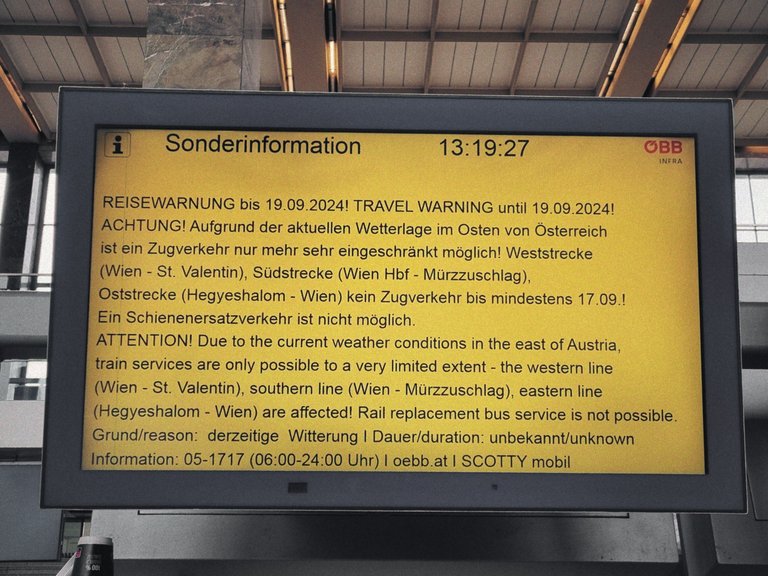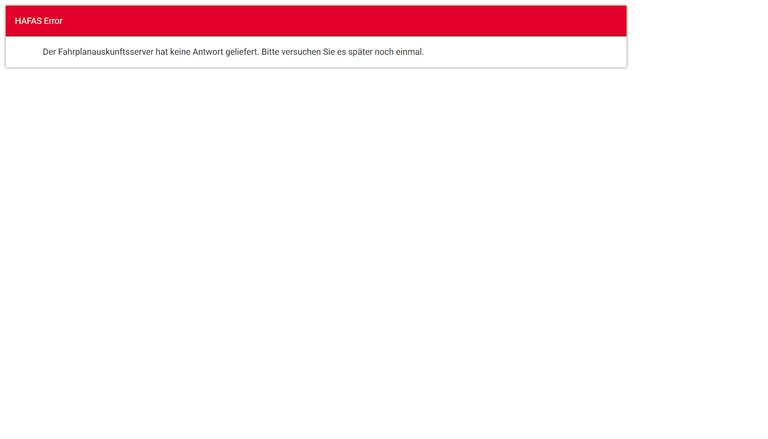Public transport is the first thing that shuts down in a crisis. Act accordingly.
Der öffentliche Verkehr ist das Erste, was in einer Krise ausfällt.
Das ÖBB-Bahnnetz und die U-Bahn waren während des Hochwassers in Wien stark beeinträchtigt.
Die U-Bahn fährt mittlerweile wieder ohne Einschränkungen und es gibt jetzt auch einen "eingleisigen" Schienenverkehr auf der "alten" Westbahnstrecke Richtung St. Pölten / Linz, der circa 30 Minuten länger benötigt als die neue Strecke über Tullnerfeld, die vermutlich wesentlich stärker vom Hochwasser betroffen ist.
Einen Schienenersatzverkehr gab es nicht.
Auch die Autobahn war kurzzeitig gesperrt, wurde aber relativ rasch wieder freigegeben.
Denke, dass das Bahnnetz leider viel anfälliger für Störungen ist. Dort gibt es viele Single-Point-Of-Failures, die auch schwerer zu reparieren sind als eine Straße.
Daher ist es in einer Krise wahrscheinlicher, dass der öffentliche Verkehr ausfällt, als dass das Straßennetz zusammenbricht.
Zu bedenken ist auch, dass die Straßen wirtschaftlich wichtiger sind, da zum Beispiel über die Autobahn beinahe der gesamte Güterverkehr und die Lebensmittelversorgung rollt.
In der Krise kann es sich daher auszahlen ein Auto zu besitzen. PKWs sind eine Art dezentrales Fortbewegungsmittel.
Auch die Kommunikation der Verkehrsbetriebe wurde kritisiert. Während die ÖBB noch Updates auf X postete, gab es von den Wiener Linien keine Informationen mehr auf X. Haben sich aus ideologischen Gründen von X zurückgezogen.
Auch die ÖBB-Website (Scotty) hatte mit Ausfällen und Überlastung zu kämpfen.
Was sagt ihr dazu? Ist bei euch auch der öffentliche Verkehr ausgefallen?
Reisewarnung ÖBB (2024-09-16)

Wegen der derzeitigen Witterung in Österreich ist von 13.09.2024. bis inklusive 19.09.2024. mit Abweichungen und Verspätungen im Zugverkehr zu rechnen.
Wir ersuchen Sie daher, nicht dringende Reisen auf einen anderen Zeitpunkt zu verschieben.
Ein Stundentakt Railjet (RJ) zwischen Wien Hbf und Wien Flughafen ist derzeit sichergestellt.
Kein Zugverkehr zwischen Wien Hbf und St Valentin bis 17.09.2024, 23:59 Uhr
Kein Zugverkehr zwischen Wien und Hegyeshalom bzw Bratislava Petrzalka bis 17.09.2024, 23:59 Uhr.
Ausfall aller ICE-Züge zwischen Wien Hbf und Passau
Es ist kein Schienenersatzverkehr möglich.
Update ÖBB Weststrecke
Ausfälle der ÖBB-Website (Fahrplanauskunft Scotty)

Update Wiener Linien
https://www.wienerlinien.at/news/update-wir-sind-auf-allen-linien-wieder-durchgaengig-unterwegs
Vienna Public Transport company left X (Twitter). Here is their official excuse
English
Public transport is the first thing to fail in a crisis.
The ÖBB railroad network and the metro were severely affected during the high water situation in Vienna.
The metro is now running again without restrictions and there is now also a “single-track” rail service on the “old” Westbahn (west bound) line towards St. Pölten / Linz, which takes around 30 minutes longer than the new line via Tullnerfeld, which was presumably much more severely affected by the flooding.
There was no rail replacement service.
The highway was also closed for a short time, but was reopened relatively quickly.
I think that the rail network is unfortunately much more susceptible to disruption. There are many single points of failure there, which are also more difficult to repair than a road.
In a crisis, it is therefore more likely that public transport will fail than that the road network will collapse.
It should also be borne in mind that roads are economically more important, as almost all freight traffic and food supplies, for example, run on the highway.
In a crisis, it can therefore pay to own a car. Cars are a kind of decentralized means of transport.
The communication of the transport companies was also criticized. While ÖBB was still posting updates on X, Wiener Linien (the metro system) was no longer posting any information on X. They withdrew from X for ideological reasons.
The ÖBB website (Scotty) also had to contend with outages and overload.
What do you think? Has public transport also shut down at your place in a crisis situation?
Posted Using InLeo Alpha

While I worked for a total of over 32 years for the railway in Canada, and I might add that Public Transportation was not their main concern, only on the Eastern corridor (Via Rail), the main business for CP and CN was Freight. And that was very efficient. In times of really bad weather, like winter conditions in Western Canada particularly, the Rail was the only one still going. We delivered goods at times where the highways were impossible, container trains of 100 cars or so, some double stacked, to terminals around the country. !hat is why I was surprised a few years ago when travelling back from Bregenz, the train went only so far, and not further, and we were bussed around the Arlberg. I was surprised because in Canada, it would be the other way around, Travelling in the Rockies by Highway was often impossible, but trains went through no matter what.
Inconvenient at times for me in a way, since at the away-from-home terminal (Crowsnest Pass on the border between Alberta and British Columbia) instead of getting a return freight, we got pressed into snowplow duty, so at times I was away from home for nearly a week, instead of the usual next day return.
That's what it looks like - but even more awesome if you are the trainman on the plow, going around mountain bends and you can't see the hand in front of your eyes, but you have to give directions to the engineer pushing behind, and if you run with a spreader behind the plow, you have to make sure the spreader wings get pulled in for obstacles like signal posts, switch stands, bridges etc. That is a team effort between you, the roadmaster and the engineer running the locomotives.
Es gibt viele gute Gründe, ein Auto zu haben (unter anderem auch das Ansteckungs- und neu dazugekommen Kriminalitätsrisiko bei den Öffis und in Bahnhofsnähe). Generell ist man damit flexibler und weniger abhängig vom Staat. Das ist auch ein Grund, warum Autos den Eliten letzlich ein Dorn im Auge sind und seit Jahren ein schlechtes Image verpasst bekommen. Mit E-Autos will man die Autofahrer besser kontrollieren.
Während Corona auch ein Problem mit der FFP2-Maskenpflicht bei längeren Zugfahrten, während im Auto glaube ich bei Personen vom gleichen Haushalt keine Maskenpflicht bestand. Manche trugen aber eine Maske, auch wenn sie alleine im Auto waren.
Stimmt, die schwachsinnigen Keimfänger, vulgo "Mundnasenschutz". Ein Grund mehr, dass ich seit Jahren in keinen Öffis fahre. Es gibt sogar heute noch ab und zu Maskitos zu sehen!
I used to live in a large city where relying on public transportation was a must. It had definitely shut down at bad times for me as well. I now prefer to have my own transportation wherever possible.
Yep, there would be restriction of movements if crisis is about to come up.
Glad the metro service has resumed once again.
Punkt fürs Auto 🚙
Whenever crises comes up, the first attention is the movement of people
It does everytime! I agree totally with you.
There isn't any crisis but when there was one in the past, the public transportation was also affected. It does suck to hear but the government tends to run things quite slowly.
Wenn man sich von X zurückzieht, finde ich ganz gut, aber ich würde sagen on Krisen sollte man eine Ausnahme machen, wenn man nicht eine deutlich bessere Alternative geschaffen hat.
Gerade in Krisenzeiten merkt man wie wichtig die Infos auf X sind, eigene Website war unübersichtlich bzw auch öfter down. Widersprüchliche Infos auf der Seite, keine Möglichkeit von Kommentaren, Fragen etc.
Public transport shuts down at any little crisis
This is why the dealers get affected a lot if there is a crazy situation in the country
Communication system has broken down which will lead to increase in food prices
Road transport is undoubtedly the most flexible means of transport today.
Transportation is really causing whole lot of havock over here too, food is very expressive at my place as well.
If there are crisis, even if there is no curfew, a lot of people may be scared to move about and that’s because it is not safe for them
In anything, transport gets affected a lot
during the covid crisis, public transpo had shut down for a short time but it shows how important it is. the government has no choice but to resume all the operation of public transpo.